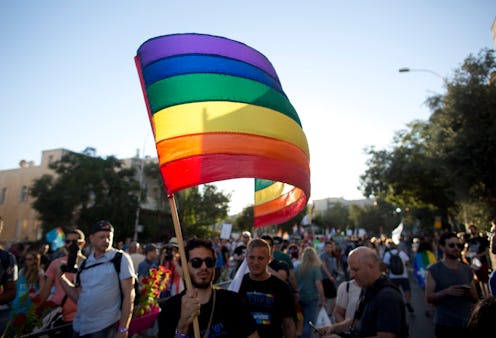A large part of feminism is obtaining equal treatment for women, so understandably, a lot of feminist efforts and rhetoric focus on women. But the problem with this is that some phrases commonly used by feminists unintentionally erase trans and non-binary people. When we talk about the world as if it consists merely of women and men, talk about feminism as solely a fight for women's rights, and conflate gender with biology, we neglect the struggles of people who don't identify as women or men or who don't identify with the gender they were assigned at birth. And often, these are the people who are the most vulnerable under a patriarchal system.
As a genderfluid woman on the non-binary spectrum, I can see where people are coming from when they talk about feminism in a woman-centric way, but I also see how it's exclusionary. Talking about the ways people have been oppressed throughout history simply because they were women is totally valid and necessary. At the same time, non-binary, trans, and other gender-nonconforming people have been completely left out not only of mainstream discussions, but also of feminist ones — and talking about women's rights alone fails to acknowledge that erasure.
In particular, here are some phrases feminists sometimes use that unintentionally neglect trans and non-binary people.
"Women Are Half The World's Population"
As Sam Dylan Finch points out in Everyday Feminism , this phrase is usually intended to illustrate how ridiculous it is to neglect the rights of so many people. But saying "half" implies that half of people are men and half of people are women, which isn't true because some people identify as pangender, agender, and a whole lot of other things besides "man" and "woman." Plus, that statistic is based on the fact that approximately half of people are assigned female at birth, which doesn't necessarily mean that half are women, since some of these people may come to identify as men, and some people assigned male at birth may identify as women.
"Everyone Came Out Of A Woman"
This is usually said to mean something along the lines of, "How can you not respect women when one went through the trouble of giving birth to you and raising you?" But this isn't always true. It's possible for people who aren't women to give birth, and it's certainly possible for a child to be raised without a mother. Plus, using this phrase implies that women are valuable because they can take care of children, which encourages benevolent sexism. Women should be respected not because they act "feminine" or provide people with labor but because they're human beings.
"Feminism Is Just The Belief That Woman Are Equal To Men"
Unfortunately, feminists often feel the need to defend themselves by talking about how feminism isn't a belief in female superiority. And it is true that feminists believe women are equal to men. But defining feminism this way ignores many of the people who need feminism the most. Feminism is the belief that all genders are equal — and all races, sexualities, and more.
"If Men Had Periods/Could Get Pregnant..."
There was a hashtag going around a little while ago called #IfMenHadPeriods, which pointed out that we as a society may be more understanding and accommodating toward people with periods if periods were associated with men. The thing is, though, many trans men do have periods. The same thing goes for statements like, "If men could get pregnant, we'd have much better family leave policies." Some men can get pregnant, and some women can't. The message of these statements — that we tend to devalue things associated with women — is important, but they imply that trans people don't exist.
"All Women Have Vaginas/Periods"
In order to destigmatize something, people will sometimes point out how many people experience it. But again, this simply isn't true. Many trans women don't have vaginas or periods, and some cis women don't either. It may be tempting to mention a common trait to invoke solidarity among women, but the truth is, there's nothing all women have in common. There are many different ways to be a woman.
"A Woman's Body Is Amazing"
Another thing we're taught in the name of women's empowerment is that it's so awesome to be able to give birth and do other things a "female body" does. But what about those of us who can't, either because we don't have a uterus or because we're experiencing infertility? What about those of us who have no interest in that? Plus, again, there's no such thing as a "woman's body." Many different women have many different bodies. Trying to make people feel proud of who they are is a worthy goal, but we can be proud of our bodies without using gender essentialism.
Images: Giphy (5)
